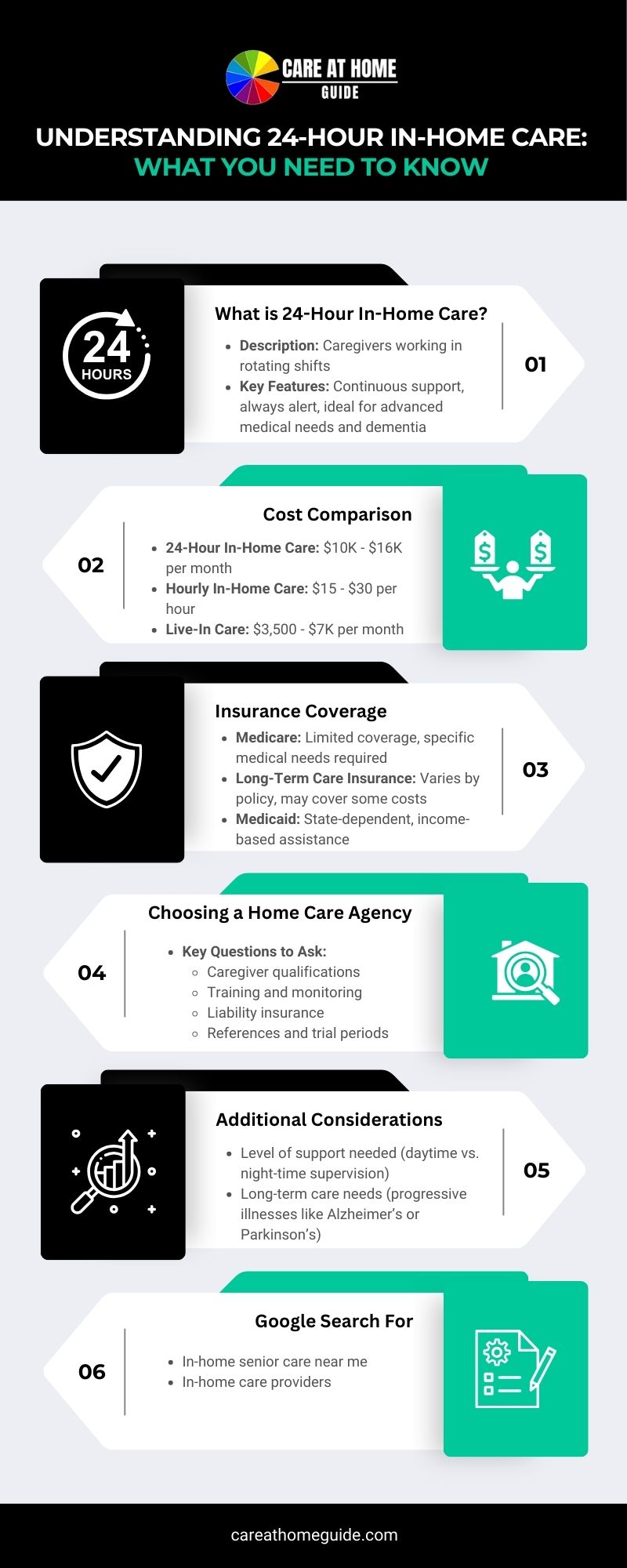
Understanding 24-Hour In-Home Care: What You Need to Know
Caring for an aging loved one often requires difficult decisions, especially when it comes to ensuring they receive the right level of care. For many families, 24-hour in-home care becomes an essential solution, offering constant support while allowing seniors to stay in the comfort of their own homes. This type of care involves a team of caregivers working in shifts to provide assistance around the clock, ensuring safety and comfort without the need for relocation to a facility.
The decision to invest in 24-hour home care comes with various considerations, including cost, caregiver qualifications, and how much care your loved one truly needs. It’s important to evaluate both the benefits and financial implications of this service, including questions like “How much does 24/7 in-home care cost per month?” or “What insurance covers in-home care?” Finding the right balance between quality care and affordability will ensure your loved one receives the support they need while maintaining their dignity and independence.

What is 24-Hour In-Home Care?
24-hour home care involves caregivers working in rotating shifts to ensure that your loved one receives continuous support. Unlike live-in care, where one caregiver stays in the home but may have sleeping hours, 24-hour care guarantees someone is always awake and alert, ready to assist. This type of care is ideal for seniors with advanced medical needs, those prone to falls, or individuals with dementia who may wander during the night.
How Much Does 24-Hour In-Home Care Cost?
The cost of 24/7 in-home care can vary significantly depending on the level of care required and where you live. On average, the 24/7 in-home care cost can range from $10,000 to $16,000 per month, making it a considerable investment for many families. In contrast, hourly in-home care cost generally ranges between $15 and $30 per hour, depending on the caregiver’s experience and the region’s market rates.
For those interested in live-in in-home care, which involves fewer caregiver shifts, the cost may be lower, though the services provided are not as comprehensive as full 24-hour care. Live-in care costs can range from $3,500 to $7,000 per month, depending on the level of assistance needed.
When deciding between 24-hour care and hourly care, it’s crucial to consider both your loved one’s needs and your budget. In some cases, affordable in-home care can be achieved by combining different caregiving options.
What Insurance Covers In-Home Care?
Many families wonder, “What insurance covers in-home care?” Medicare does not typically cover 24-hour care or custodial care unless specific medical needs are present. However, long-term care insurance might cover a portion of the cost, depending on the policy. It’s important to review the details of your insurance plan to understand exactly what is covered and what expenses you will need to handle out-of-pocket.
Medicaid, on the other hand, can sometimes provide assistance for in-home care depending on income levels and specific state regulations.
How to Choose a Home Care Agency
Selecting the right agency is crucial when arranging in-home senior care. Start by researching agencies and asking for recommendations from healthcare professionals. It’s essential to verify whether the agency is licensed and if the caregivers are insured and bonded. Understanding the agency’s hiring practices is also critical, as you want to ensure that caregivers undergo thorough background checks and are qualified to handle medical or personal care needs.
When considering how to choose a home care agency, ask the following questions:
- What qualifications do the caregivers have?
- How are caregivers trained and monitored?
- Does the agency have liability insurance?
- Can they provide references from current or past clients?
It’s also a good idea to consider agencies that offer a trial period so you can ensure the caregiver is a good fit for your loved one’s needs. For those searching locally, keywords like “in-home senior care near me” or “in-home care providers” can help find qualified agencies in your area.
Additional Factors to Consider
Aside from cost and caregiver qualifications, there are other important considerations when arranging for home care for elderly individuals. It’s essential to think about the level of support required. For example, if your loved one only needs help during the day, hourly in-home care may be the most affordable solution. If night-time supervision is necessary, 24-hour care becomes more crucial.
You should also factor in long-term needs, especially if your loved one has a progressive illness like Alzheimer’s or Parkinson’s, where care requirements will likely increase over time.
Finding the Right Balance: Quality Care and Cost Considerations
Caring for an elderly loved one can be emotionally and financially challenging. However, 24-hour in-home care allows them to stay in the comfort of their home while receiving constant support. Though the monthly cost of in-home care may seem high, the peace of mind and personalized care it offers are invaluable.
When choosing a care agency, consider both the 24/7 in-home care cost and the quality of the caregivers. Make sure they have the experience and compassion needed to meet your loved one’s needs.
Research different agencies and explore financial options, including insurance, to find the best caregiving solution for your family’s needs and budget.
Resources:
- Around-the-Clock Home Care – Homewatch CareGivers
- Live-in or 24-Hour Care Allowing Elderly Adults to “Age in Place” in Their Homes – Visiting Angels
- How Much Does 24/7 Home Care Cost in 2024? An In-Depth Guide – A Place for Mom
